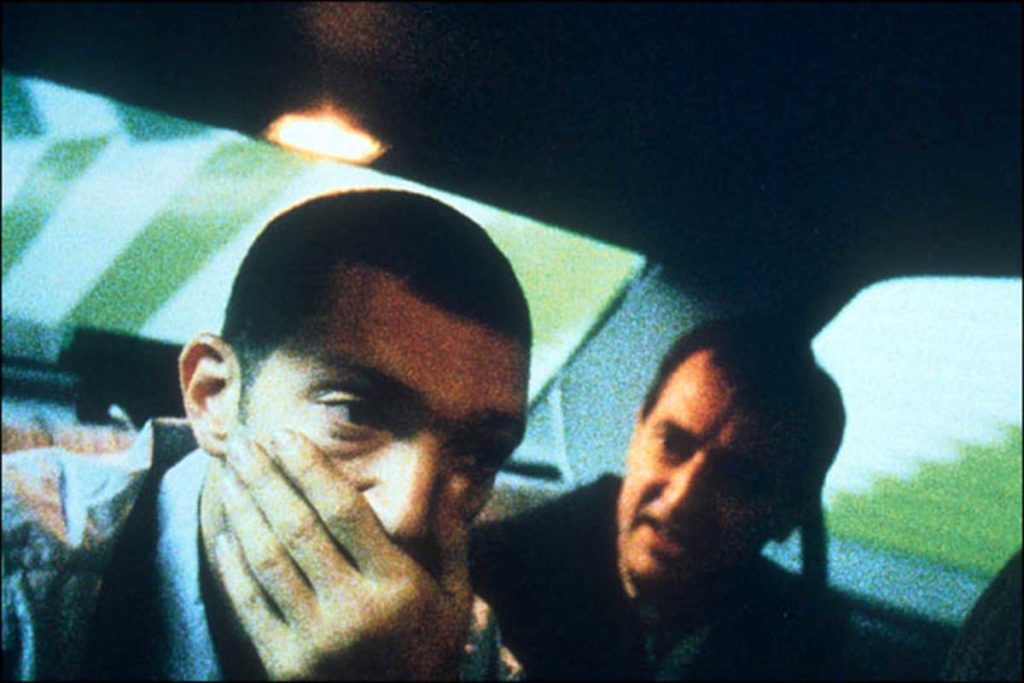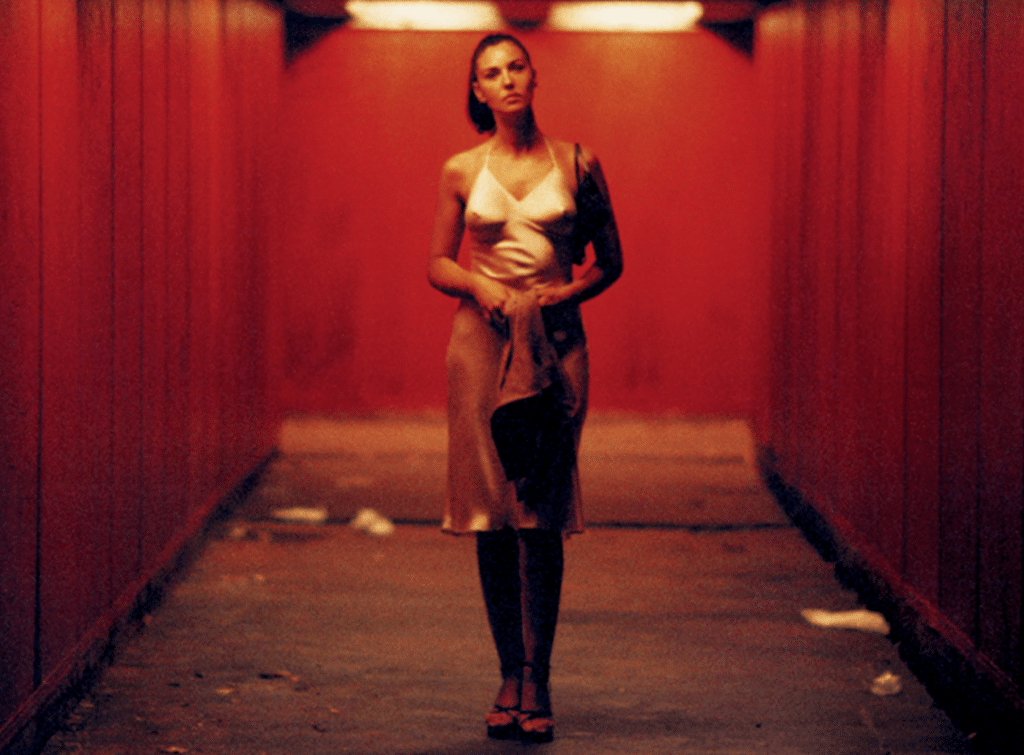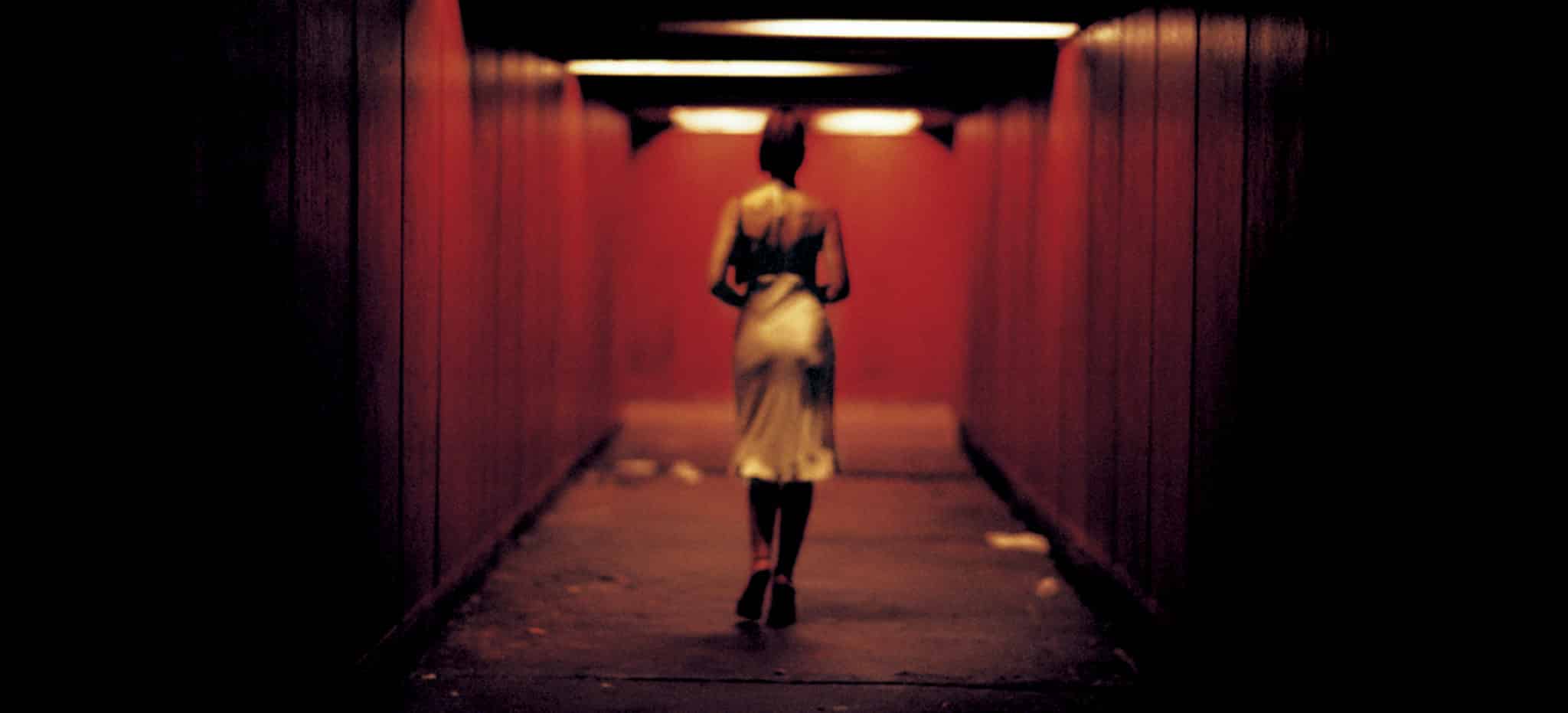
Irreversible does, at least, warn us of what is coming.
In its first few minutes, with its hammering soundtrack, its almost infrasonic hum, its extraordinary, pinballing camerawork and its first pitstop with two odious, broken men who warn us that ‘time destroys all things’, the film instils a kind of sensory fight-or-flight response. It sets up the audience as either helpless accomplices, or unwitting witnesses. How are we to deal with this? Stick with it; try to get one’s balance; try to follow whatever is happening here? It is, without doubt, a challenging film. Even after years of the New French Extremity and ‘torture porn’ which followed in its wake, it hasn’t lost any of its capacity to appal; how could it? With its blend of horrific, plausible violence and threat together with a start/end point which is calm, hopeful and refreshingly mundane, it shows us that these two states of being are irretrievably one and the same. It is frightening, and it is depressing. The feeling, come the end, is a kind of affronted despair.
‘You know Le Tenia?’
We are almost immediately thrown into a world of sirens and police lights: a man on a stretcher, a man being escorted by police. Dysphemism and venom punctuate the script; whatever has happened in this nightclub, the plainly-named Club Rectum (oh come on) it speaks of violence, secrecy, voyeurism. But whatever shake of the rattlesnake’s tail we get in these opening minutes, it’s as yet only a brief warning. Taken as a whole, the theatrical cut of this film is assault after assault after assault. It ditches conventional structure, plot and format, but it’s more than that. The overriding feeling, by the end of this film (dropping the expected, safe-distance of a set of end credits, as Noé prefers) is that we have been forced to be complicit. .
The theatrical version of Irreversible tells a rape/revenge story in reverse; under a barrage of homophobic abuse, the two men getting dragged in various states of disarray from Club Rectum are Marcus (Vincent Cassel) and Pierre (Albert Dupontel). Pierre is on his feet, but under arrest; Marcus is badly hurt. We then shift back to an earlier episode, watching the men arriving at the club, earnestly searching for a man nicknamed Le Tenia, or ‘tapeworm’ in English; if this is a Noé joke, then bravo, as it’s a bad one. Marcus is a threatening presence here – wired, volatile and hurling around the kind of language we have just heard being hurled at him – and this is Cassel honing his skills as an imposing, irrational character, speaking here from some primordial fug of rage. That the conversation throughout the film is quite so naturalistic makes the words hit harder; Pierre is, or at least seems to be, more rational, along in some kind of companion capacity, but gradually a new name begins to appear. The name is ‘Alex’; Alex is Marcus’s girlfriend, Pierre’s friend and former lover. She is as yet conspicuous by her absence, but the next episodes introduce her, or what is left of her, to the film.
We are around halfway through Irreversible before we see Alex (Monica Belucci), although the after-effects of her rape by Le Tenia overshadow the whole film. Either because we have seen what happens, or because we are forced into the role of knowing, even as we are transported back to a point when she does not know what is going to happen. Due to its savagery, much has already been written about the rape itself – hideous, unflinching and a point when the spinning camera, which has thus far made an artform out of nausea, finally elects to stay completely still. It is certainly not to ignore this aspect of Alex’s ordeal, but perhaps to look somewhat past it – at what this ordeal says to us and about us, as an audience and as people who are more than just audience members.
First the camera makes us feel that we are somehow unwelcome in this story – we can’t focus, it’s hard to follow, we are not granted the luxury of a range of well-framed, static shots. And then, when we are, it’s for a nine-minute rape scene, something we would rather not be made to see. As Alexandra Heller-Nicholas points out in the interesting video essay which accompanies this release of the film(s), many of us would, however we might rationalise it to ourselves, sooner take the role of the peripheral figure we see move into shot, mid-way through the rape; he doesn’t help, instead turning away and leaving. We may feel disgusted by his failure to help, but it is what we would likely choose, had Noé given that as an option. An uncomfortable truth, in a film full of them.
‘Well, look at you…’
But – around the circumstances of the rape itself – this is a film full of people failing to help. Failing to get revenge, failing to restore order, failing (as in the case of the police) to do anything in a timely way, usually popping up on the periphery themselves, with sirens and arrests floating just out of the bounds of the film. Marcus and Pierre eschew their help from the point in time when they recognise Alex, her face obliterated by Le Tenia’s violence, but the crooks they hook up with do rather little for them either; after they have roughed up another woman, this time the trans woman we know is associated with Le Tenia, they are somewhat uncomfortably-laughably chased away by a group of trans sex workers. The film also becomes a parable about faces and facelessness, with omitted or changed identities, partially-glimpsed people, and of course a grand, tragedy-worthy error in the murder of a man who is not the rapist. Really speaking, this film is rape, but not revenge; Le Tenia grins through the murder scene with the appalling, sadistic curiosity of the man we know him to be. After everything, we know he will live to fight another day; he escapes. The whole revenge arc is deeply flawed, almost tilting at windmills. Meanwhile, Alex is alone at the hospital. Her avenging angels are broken and condemned. This is just one of those realisations which lands some time after the credits…well, after the point when the end credits would usually roll.
There are other unpalatable comments and inclusions in the film which can take a little longer to truly land. One of those relates to social class. A large share of the self-justification for Le Tenia’s attack on Alex seems to come down to his perception of her ‘superiority’. What is this based on? Simply her clothes and demeanour; she doesn’t get an opportunity to tell him anything about herself. It’s based on little, but even in a film permeated with violent derogatory language, it’s more than enough for Le Tenia to keep circling back to, referring to Alex as ‘high class’ and a ‘fucking rich bitch’. Elsewhere, the men at the beginning of the theatrical cut in what may be a kind of halfway house (one declares he has recently been released from jail) are not exactly from a successful demographic; Le Tenia is a crook and a pimp, who keeps company with those in a dubiously legal sex club; Marcius and Pierre employ petty crooks, who constantly hector for payment; sex workers – another disempowered social group – crop up several times as temporary players. Immigrants and economic migrants also tend to be peripheral figures.
This is a modern France, but one with an underbelly; those who form part of its underclass either lash out (Le Tenia) or are simply glad to dodge momentarily away from its innate violence and cruelty (such as Donna, the prostitute we see Le Tenia kicking on the floor.) Going off the beaten path in this film spells danger, but then even perceived differences can be used to justify horrendous treatment (alongside, of course, gender – to follow). But class is an unsettling contextual consideration in Irreversible, with conflicts and assaults taking place in liminal spaces often unseen. Regions of the city which are isolated or unfrequented become strangely separate spaces, with their own rules and risks.

The blood red underpass in the film is a key setting, and featured in the film’s original promotional materials. It is also, peculiarly, almost a supernatural space, at least for a moment, as Alex reveals (during one of the film’s rare, if foreboding intimate, calm moments) that she’s dreamed of this place. Perhaps a premonition is too much to call it, but her dream certainly underlines the sense of something inescapable and awful about to hove into view here. Alex explains the dream by making reference to a late period; the links between this and blood/birth (she reveals that she is in fact pregnant) is clear enough, a kind of Freudianism 1a. It also resembles the ‘red room’ in Jane Eyre, coincidentally or otherwise, the space in which Jane’s uncle died, and where she gets locked as punishment whenever she asserts herself, to be freed only when she demonstrates “perfect stillness and submission”. In the novel Jane Eyre, it marks a profound shift in Jane’s life when she does, eventually, escape Gateshead Hall. The red room is also the culmination of Jane’s mistreatment on the grounds of her lower social class and her ugliness; Irreversible shifts this around, so that Alex is raped through the toxic combination of her beauty, and her (perceived) high social class. It is also, in the theatrical cut, where we first encounter Alex; this space defines her, disfigures her, and ends life as she knows it – though, again omitting a sense of closure, we know only that she eventually departs the film, like her partner, on a stretcher, to an unknown, unknowable fate.
‘Put that in your primal brain!’
But let’s address what is, for me, something which follows the film throughout, ending to beginning, beginning to ending, whatever cut you choose; its repellent masculinity. As much as Alex’s rape is deemed (by her rapist) to be about social power, it is still a rape – a man attacking a woman, and lambasting her for being a woman as he goes. We see it all. Sure, the film goes a bundle on its homophobic slurs at/outside Club Rectum, but the men inside the club are engaging in consensual sex; male rape is threatened, and it is horrible when it is, but it doesn’t actually happen. In fact, Pierre steps in to save Marcus from the rape; what do you know, rape can be stopped. However, what this shows is that gay or straight, rape is a viable option for men, a kind of violence and dominance for them to select out of the range they have to choose from. Ultimately, for me, Irreversible is a story of predatory, desultory and failed men. Women are collateral.
For Marcus, his first real thought is to avenge the treatment of his girlfriend by going after the man responsible; it becomes about him, in a way which just doesn’t feel right. He’s too nervy, too loaded, knows too little, and expends a wealth of energy on men who have nothing to do with his chosen mission. Just as Le Tenia questions Alex’s outfit by asking if ‘her man dresses her like that’, insinuating that she doesn’t have full ownership over herself, then Marcus echoes this; remember that he says he ‘stole Pierre’s girl’, and gets corrected by Alex, who tries to assert that she can make choices for herself. She does it laughingly, but she asks not to be treated like an object. Watching the theatrical cut, you notice that – as much as Marcus does seem to love Alex (Belucci and Cassel were married at the time they made this film together), his treatment of her has echoes in her later assault. When they wake up, he covers her mouth with his hand; he grabs and restrains her in ways which feel less playful, knowing what will happen to her. He does and says things which are taken to their zenith in the assault, even telling her that he wants anal sex with her – something which forms the basis of her rape. His words indicate casual, accepted attitudes towards women, restricting their speech, their movement. Marcus is not the villain, but he’s overbearing, and it is his lecherous, voyeuristic behaviour at the party which all three attend which causes Alex to leave early, triggering later events. His behaviour is a faint but disconcerting echo of a whole host of casually-held opinions and beliefs about women, taken to their extremes in the film.
Pierre, too, whom we glean was rejected by Alex for his over-philosophising, shifts from the reluctant voice of reason to the film’s most – or equally, at least – violent man. The impact of all of this wheeling violence for Alex – should she live – will be to redouble her own trauma. But, still, to Noé’s credit, that this is not a standard rape/revenge arc where a woman, after suffering rape and violence, conjures up an unrealistic amount of physical strength to repay her attackers. It would be a weaker film if it did, and another insulting fantasy where women are thrown a sop, an insulting fictional counterbalance in a world where many women have good reason to fear male violence without redress.
Irreversible is nothing if not painfully, jankily, unforgettably realistic. It’s a resoundingly unpleasant watch, but an important film which pushes past exploitation cinema to become something altogether more profound. There’s no closure, no answers, and only an uneasy happiness about to come apart at the seams.
Thanks to Vinegar Syndrome, both the original cut and the straight cut of Irreversible are about to be released together for the first time. Coming to Blu-ray and DVD on 27th June 2023, this release will feature 42 minutes of interviews and special features. For more information, click here.
